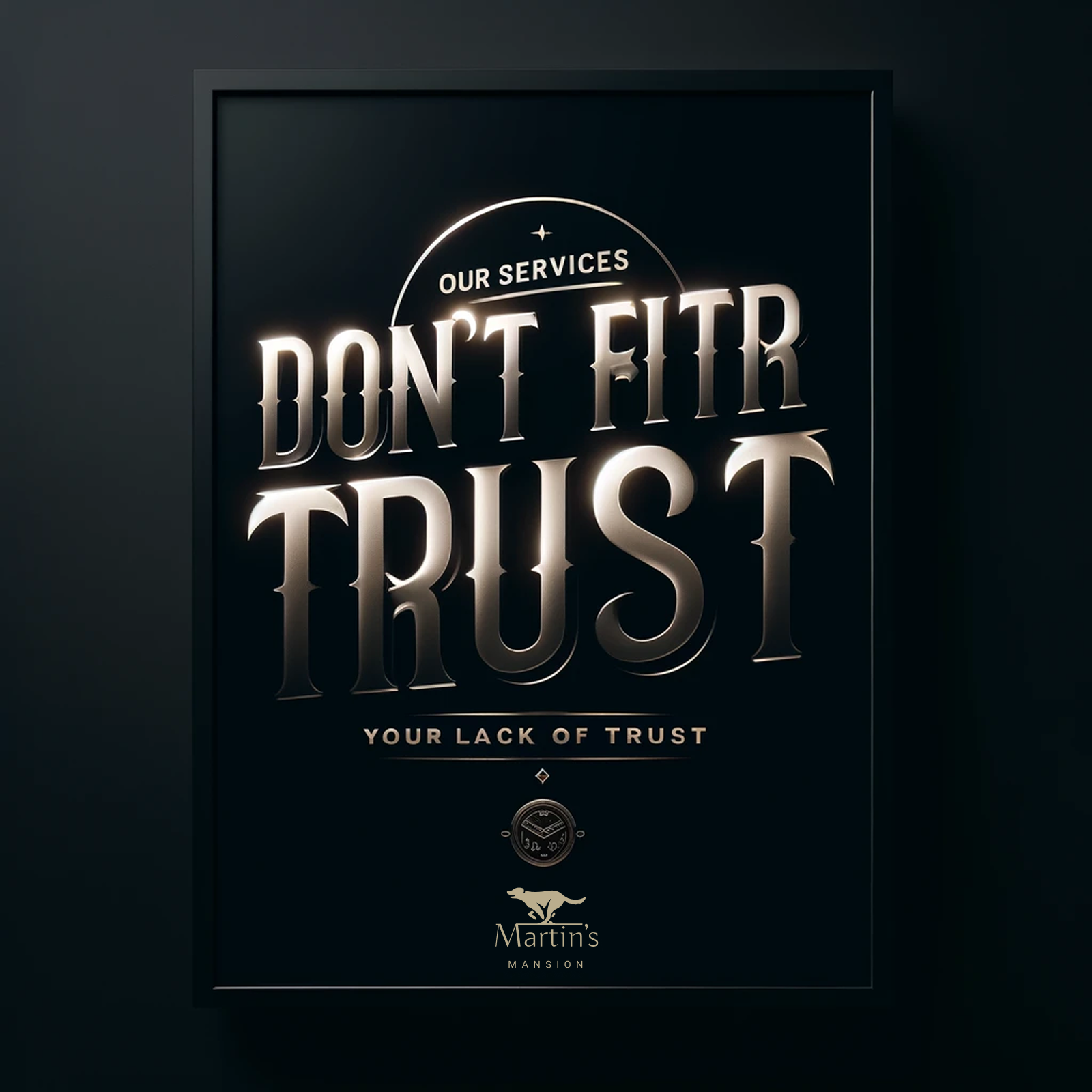Rotate Your Device
to continueBlog.
- Martin's Home
- Fass-hion Magazine
- Fashion & beauty
- Fashion Copywriting
- Blog
- About
- Contact Us
- Subscribe
Our Sevices don't Fit your Lack of Trust!
COPYWRITING
24 March 2025

Trust is the key to quality - we stand by it!
We don't chase clients - we attract the right ones.If you don't trust us, our services aren't for you. We don't rely on gimmicks or exaggerated claims. Instead, we let our quality, expertise and proven results speak for themselves.
We don't waste time on empty promises. Our services are for those who know what they want and don't need to be told. We work with customers who understand true value, appreciate quality, and demand reliability.
If you're hesitant, that's okay. We're not for everyone. But if you trust in quality, innovation and integrity, you've found the right place.
“Our services don’t fit your lack of trust.”
First impressions may lead you to believe it's counterintuitive, but it's actually a bold strategy. The headline isn't just a statement; it's designed to spark curiosity, boost brand confidence and target the right audience.
In this article, we're going to delve into the intriguing world of this headline, exploring its nuances from various angles. We'll dive into the fascinating realms of marketing psychology, trust-building, consumer behaviour, and its role in branding. By the time we reach the end, you'll not only have a deeper understanding of why such a phrase works – you'll be equipped with the knowledge to apply it in your copywriting with confidence!
1. The Power of Reverse Psychology in Marketing
This headline is a real game-changer. It flips conventional advertising on its head. Most brands try to convince customers why they should trust them, often through guarantees, testimonials, or risk-free offers. But this headline does the opposite. It subtly challenges the customer's mindset.
How Reverse Psychology Works in Copywriting
Reverse psychology is an incredibly effective persuasion technique that encourages people to do something by suggesting they do the opposite! It taps into the natural human tendency to resist being told what to do, which makes it so exciting. In this case, saying "our products don't fit your lack of trust"creates an intriguing contradiction that people will love!
If I don’t trust the product, does that mean it isn’t for me?
If I trust the product, then it must be worth my time.
Am I being too skeptical, and should I reconsider?
By making trust a prerequisite, the brand positions itself as selective, almost elite, implying that only the confident buyers belong in its customer base.
The Psychological Trigger: FOMO (Fear of Missing Out)
This amazing technique also triggers FOMO (Fear of Missing Out), which is a fantastic thing! When people feel excluded from something valuable, they naturally want to be included. Instead of persuading customers with discounts or sales, this approach makes trust the admission ticket to the brand experience, which is incredible!
2. Establishing Brand Confidence and Authority
It's so inspiring to see a brand that openly states, "We are not for everyone"! This immediately exudes confidence. And it's a great approach to take, especially for premium brands. After all, they don't try to cater to every customer. Instead, they focus on those who appreciate their value.
Positioning as a High-Quality, Exclusive Brand
By subtly suggesting that their products might not be for everyone, the brand is effectively communicating:
We stand by our quality. There’s no need for defensive marketing.
We have nothing to prove. The value speaks for itself.
We serve a specific audience. If you don’t fit, you’re not our target.
Trust as a Two-Way Street
This headline is great! It really gets across the idea that trust should be mutual, which is fantastic. The brand isn't just asking for customers' trust – it's stating that it trusts its audience as well. This implies that the company has standards and isn't willing to bend over backward for skeptical buyers, which is great to see!
3. The Emotional Impact of Trust in Purchasing Decisions
Trust is one of the most crucial factors in consumer decision-making, and it's something we can work with! A lack of trust can lead to hesitation, price sensitivity and scepticism, but we can overcome these barriers to get those conversions!
How Customers Evaluate Trustworthiness
Before making a purchase, customers subconsciously evaluate trust based on:
Brand reputation (e.g., reviews, testimonials, industry recognition)
Consistency (e.g., quality across multiple products, years in business)
Transparency (e.g., clear pricing, refund policies, ethical practices)
Social proof (e.g., endorsements, user-generated content, influencer partnerships)
By boldly addressing the trust factor in the headline, the brand invites potential customers to reflect on their own biases.
Do I distrust this brand for a valid reason?
Am I unfairly skeptical?
Is my hesitation stopping me from experiencing something great?
This introspection can open up a whole new world of mindset, making the prospect more open to trusting the brand.
A Headline That Sells by Challenging Perceptions
"Our products/services don't fit your lack of trust" is an incredible masterclass in psychological persuasion. It combines reverse psychology, exclusivity, and emotional triggers to:
Create intrigue and curiosity
Position the brand as confident and high-value
Filter out unqualified customers
Encourage self-reflection in potential buyers
In a world where consumers are drowning in marketing messages begging for their trust, this headline stands out by boldly demanding it. It tells customers: If you want the best, you just have to believe in it!
“If you’re looking for quick, cheap fixes, our services aren’t for you.”
“Our results require commitment—only serious clients will succeed.”